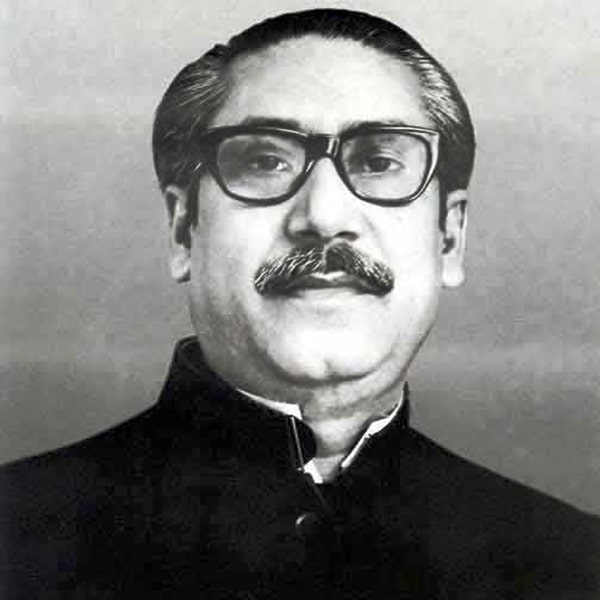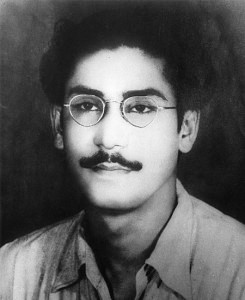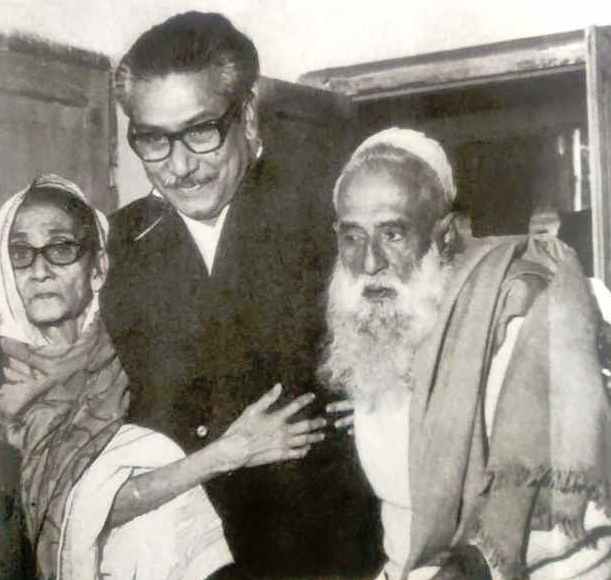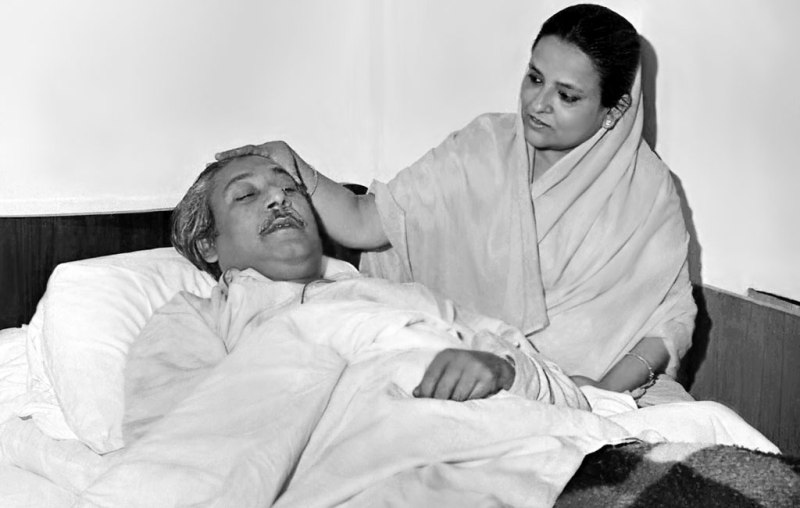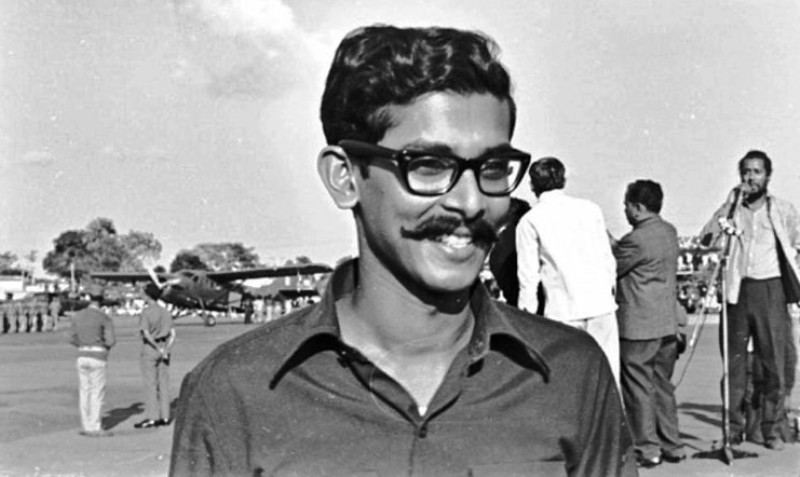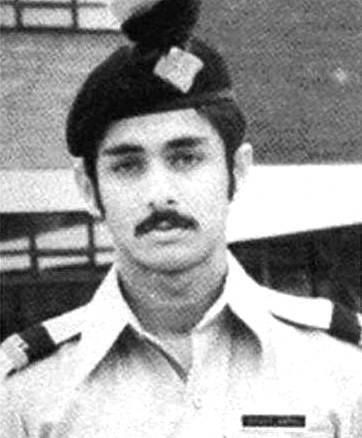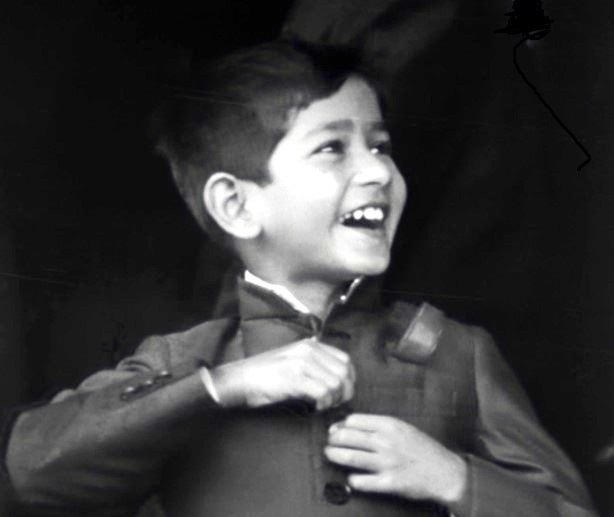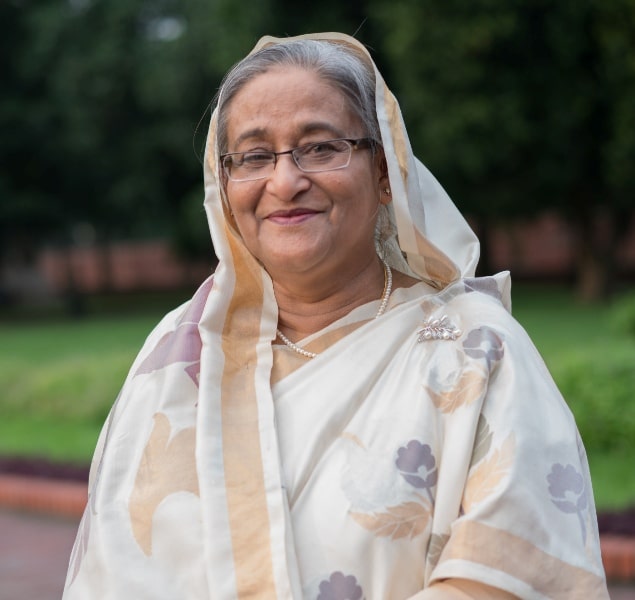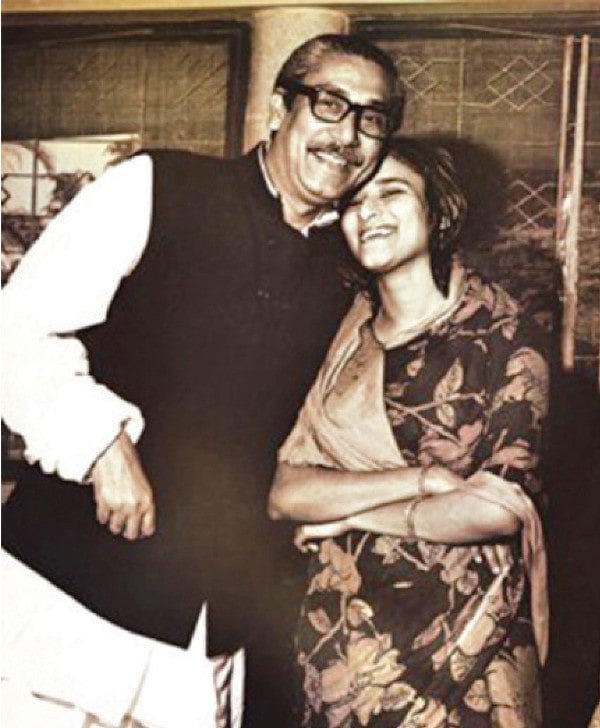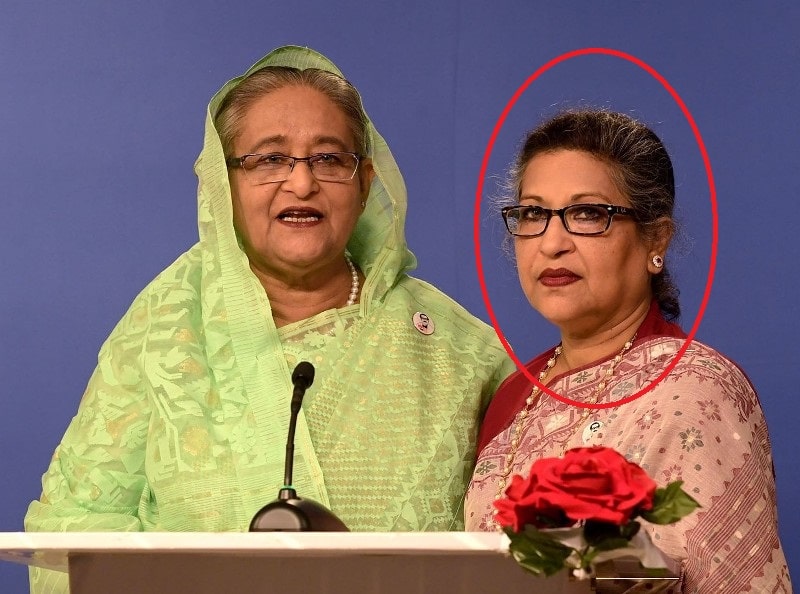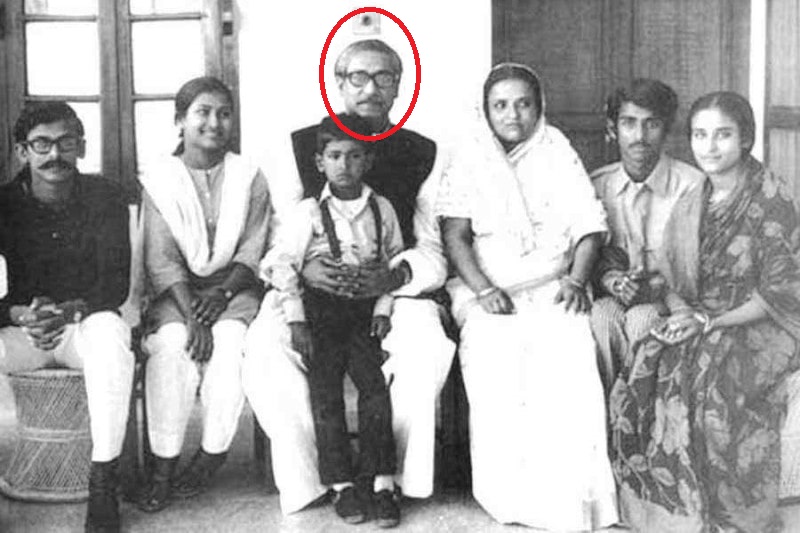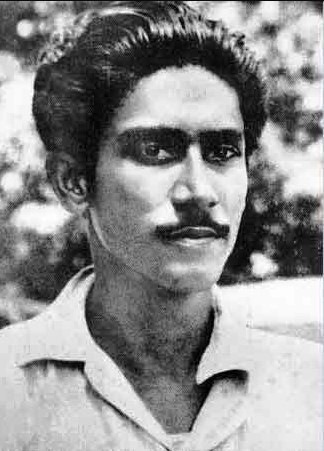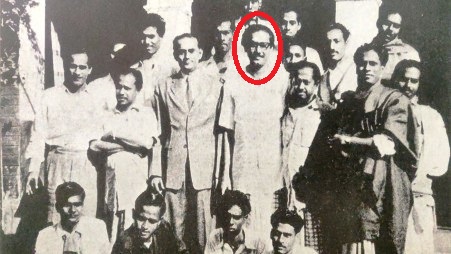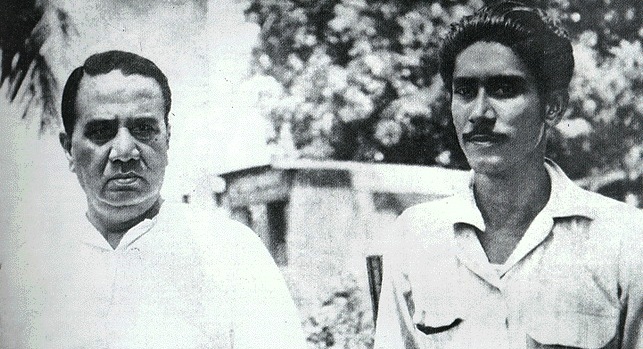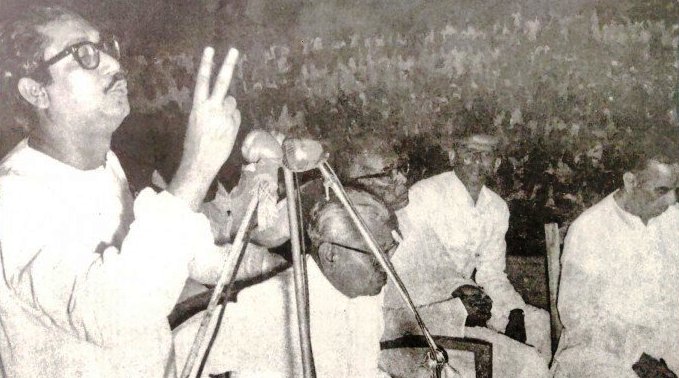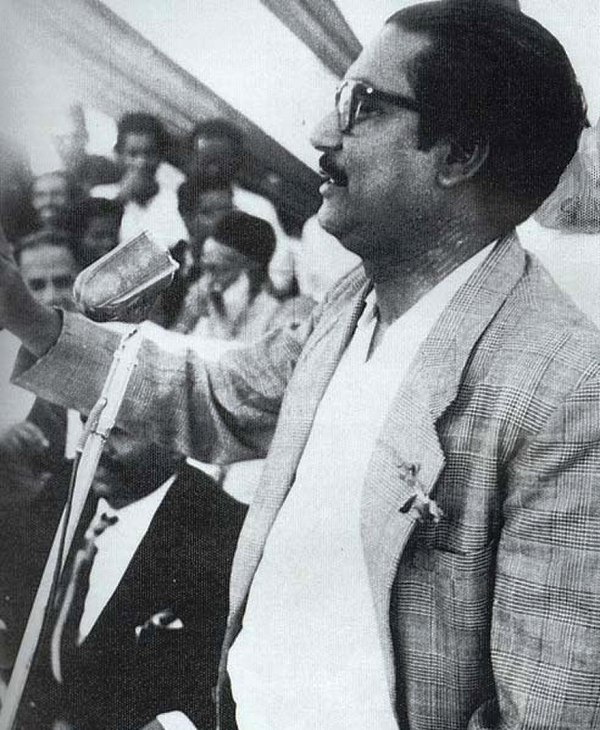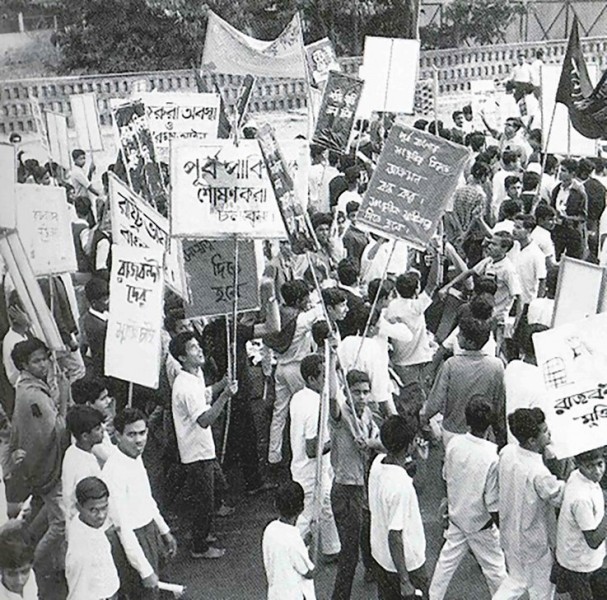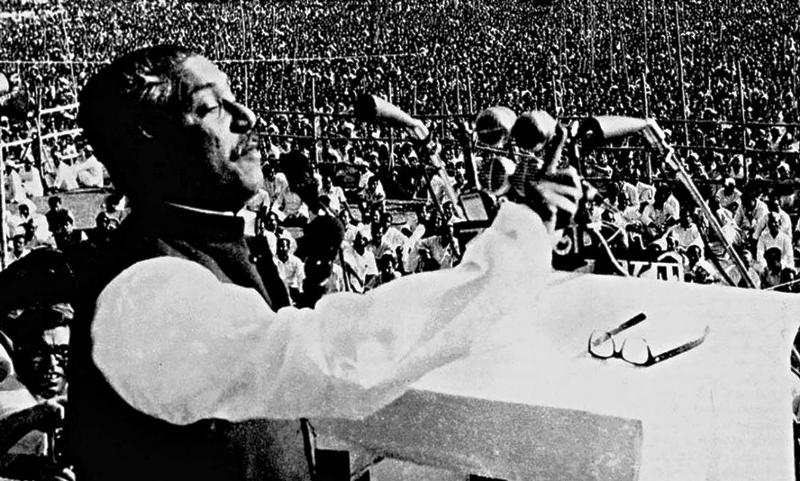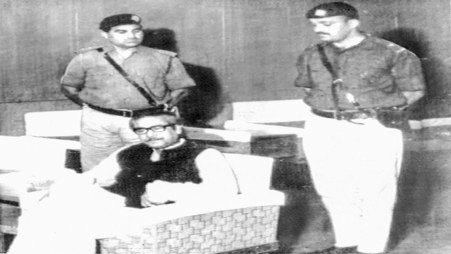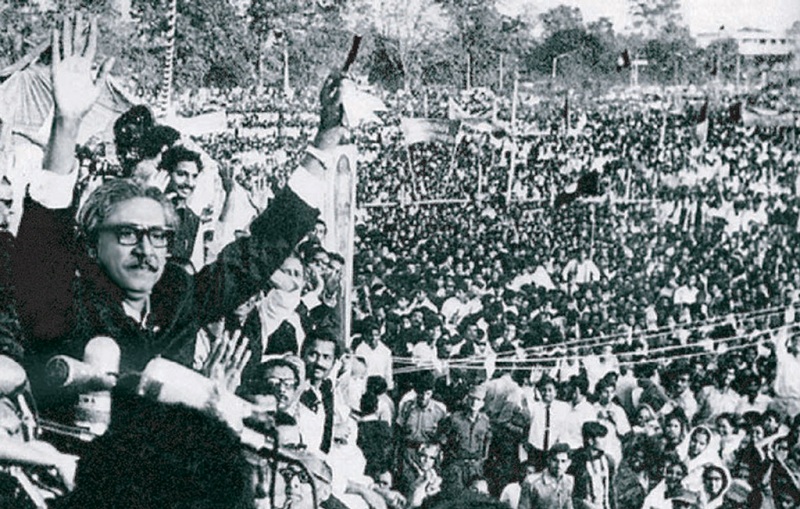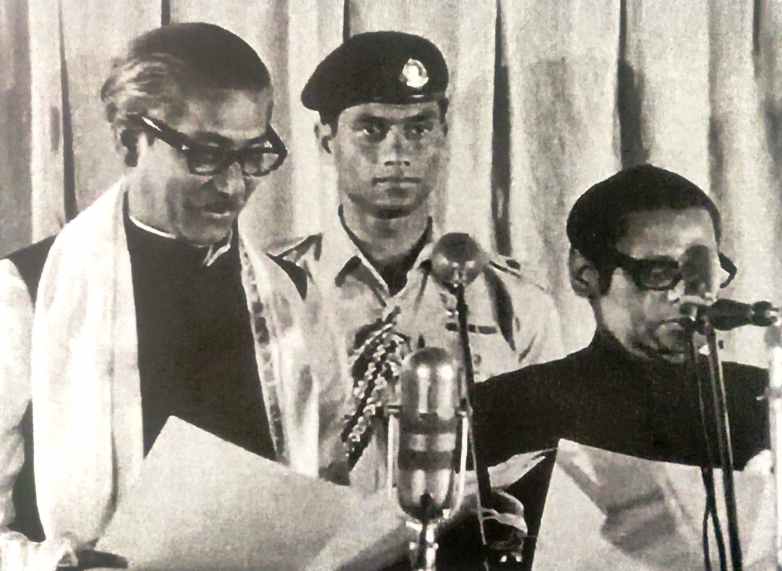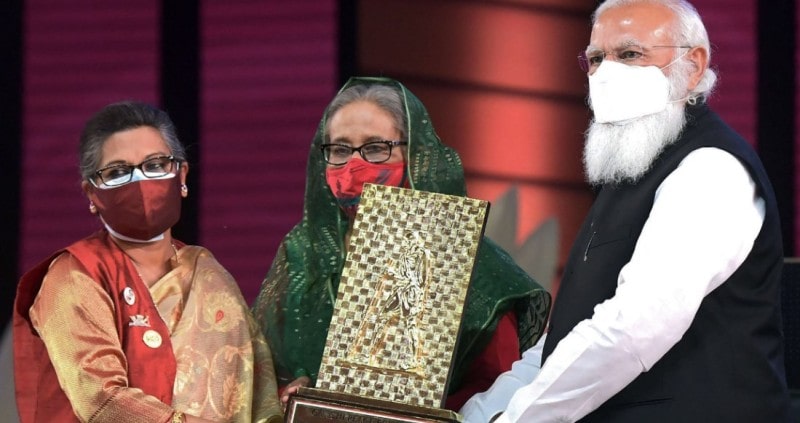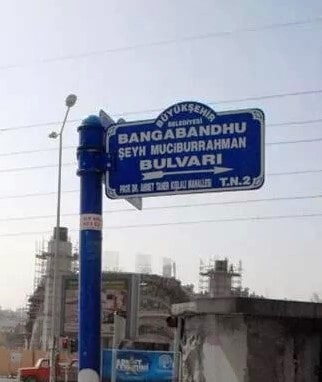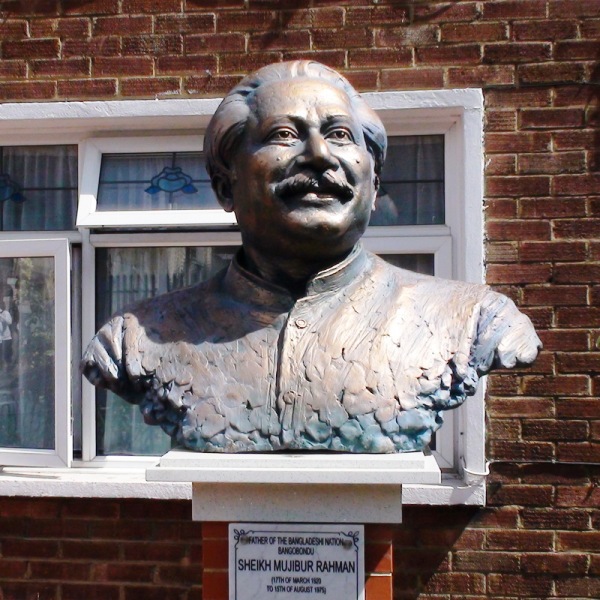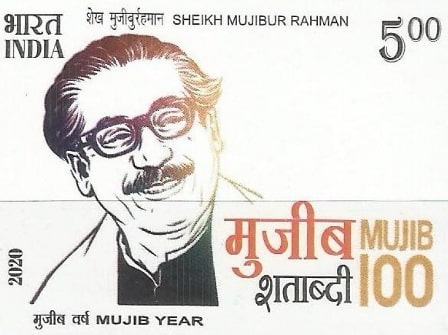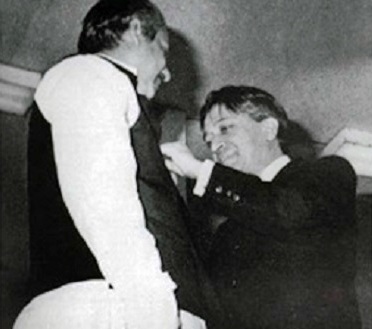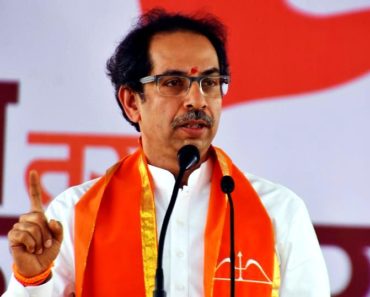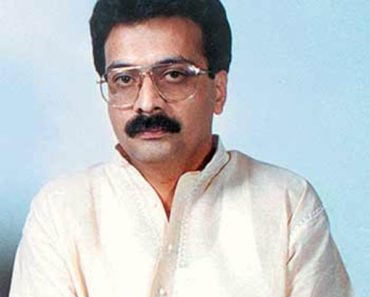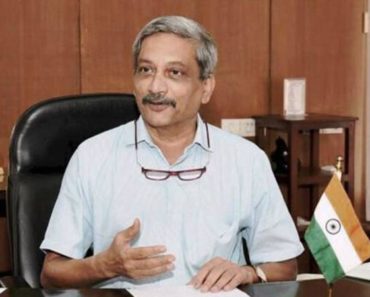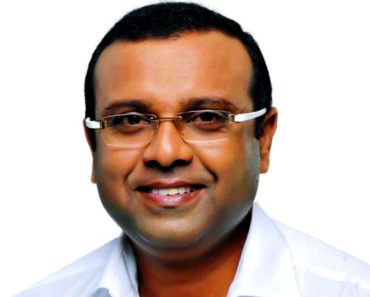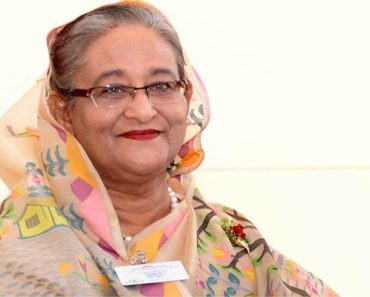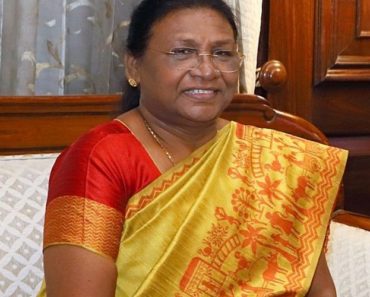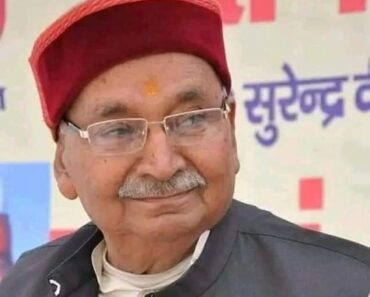Sheikh Mujibur Rahman was a Bangladeshi politician and a statesman. He is also called known as Bangladesh’s father of the nation. The entire movement for the freedom of Bangladesh from Pakistan was his brainchild. He was among the first and few politicians who stood against the policies of West Pakistan. Sheikh Mujibur Rahman became the first President and, later on, the first Prime Minister of Bangladesh after the Bangladesh liberation war of 1971. He was assassinated on 15 August 1975. He is also known as “Bangabandhu” which means friend of Bengal.
Contents
Wiki/Biography
Sheikh Mujibur Rahman was born on Wednesday, 17 March 1920 (age 55 years; at the time of death) in Tungipara village, Gopalganj district, Province of Bengal, British India (now in Bangladesh). [1]Banglapedia In 1927, Mujib was admitted to Gimadanga Public School. In 1929 he was enrolled in Gopalganj Public School, a local school. He exhibited early signs of leadership as he organized a massive protest against his school principal, who was not able to perform his duties up to the expectations. In 1931, he took admission to Madaripur Islamia High School. [2]Independence of Bangladesh in 266 days: history and documentary evidence. Dhaka by Muhāmmada Nūrula Kādira Three years later, in 1934, Mujib had to withdraw himself from school as he had to undergo complicated eye surgery. [3]The Unfinished Memoirs by Sheikh Mujibur Rahman After undergoing a full, yet slow recovery, Mujib continued with his studies. He completed his matriculation in 1942 from Gopalganj Missionary School. He, later on, in 1944, completed his intermediate level studies in arts from Islamia College. In 1947 from the same institute he obtained his Bachelor of Arts degree. [4]Banglapedia In 1947, soon after the partition of India, Mujib was enrolled in Dhaka University to undertake further studies in Law. He was expelled from the university on the charges of inciting a protest among class four employees of the university. [5]Banglapedia
Physical Appearance
[6]Dhaka Tribune Height: 5′ 11″
Family
Parents & Siblings
Parents
His father’s name was Sheikh Lutfur Rahman who worked as a record-keeping official at Gopalganj civil court. [7]Lokmat Times His mother’s name was Sayera Khatun.
Siblings
Sheikh Mujibur Rahman had a younger brother named Sheikh Naser and four sisters named Sheikh Fatema Begum, Sheikh Asia Begum, Sheikh Amena Begum and Khadijah Hossain Lily.
Wife
Sheikh Fazilatunnesa Mujib was the wife of Sheikh Mujibur Rahman. She was only 8 years old when she was married to Sheikh Mujibur Rahman in 1938.
Children
The couple, later on, had 5 kids, which included 3 sons and 2 daughters.
Sons
Sheikh Kamal was the eldest son of Sheikh Mujibur Rahman. He served as an officer in the Bangladesh Army during the 1971 Bangladesh Liberation War and left the army from the rank of a Captain. He was killed on 15 August 1975.
Sheikh Jamal was the second son of Mujib. He was serving in the Bangladesh Army as a Second Lieutenant in the East Bengal Regiment and was killed on 15 August 1975.
Sheikh Russel was his youngest son. He was just 10 years old when he was killed on 15 August 1975.
Daughters
Sheikh Hasina is the eldest of Sheikh Mujibur Rahman’s five children. She is presently the Prime Minister of Bangladesh.
Sheikh Rehana is the younger daughter of Sheikh Mujibur Rahman. She is a politician and is closely related to the Awami League.
Religious Views
Sheikh Mujibur Rahman was a follower of Islam. [8]Banglapedia
Address
He resided at Bangabandhu Bhaban, House Number 10, Road Number 32 (Old), 11 (New), Dhaka – 1209, Bangladesh. [9]Bangabandhu Museum Official Website Now his place of residency has been converted into a memorial museum.
Signature/Autograph
Career
Political career as a student
Mujibur Rahman was actively involved in politics even before Independence. In 1940, Mujib joined the All India Muslim Student Federation. Later, in 1943, he joined the Bengal Muslim League and openly supported the Muslim League’s demand for a separate Pakistan for Muslims. As he went on to complete his graduation; Mujib became the general secretary of Islamia College Students Union. Mujib became closely affiliated with Huseyn Shaheed Suhrawardy (who was Pakistan’s Prime Minister from 1956-57). Suhrawardy saw the capabilities of Mujib, as a result of which Mujib worked under Suhrawardy during 1946, pre-partition, Hindu- Muslim riots in Calcutta. [10]The Third World Charismat: Sheikh Mujib and the Struggle for Freedom by Zillur R. Khan
Political career in the newly independent Pakistan
After the partition, Mujib stayed in Pakistan. He was greatly moved by sensitive issues such as poverty, unemployment and widespread hunger in the country, as a result of which, Mujib started following the concept of socialism. Upon taking admission to the University of Dhaka, Sheikh Mujibur Rahman established a new student organization, known as the East Pakistan Muslim Students’ League and went on to become one of the most well-known politicians in East Pakistan. [11]Daily Sun
The movement for safeguarding the Bengali dialect
On 21 March 1948, the then Governor-General of Pakistan, Muhammad Ali Jinnah, passed a resolution that made it mandatory for the Bengalis to learn Urdu and adopt it as the state’s official language. Agitated by this decision, Mujib rose against the arbitrary rule of the West Pakistani government. He organised a large number of protest rallies; opposing the decision. In March itself, Mujib and some other activists were arrested from Dhaka University and were placed under custody. Due to the pressure from the widespread students’ protests, Mujib and other activists were released early. Mujib was arrested a second time as he was organizing a protest march for securing the rights of the University of Dhaka’s employees. Upon his release, Mujib once again got involved in university politics as a result of which he was fired from the university itself.
Formation of East Pakistan Awami Muslim League
After being released from jail, Mujibur Rahman left the Muslim League and joined Suhrawardy’s newly formed East Pakistan Awami Muslim League. In 1949, while protesting against the widespread famine and food shortage in East Pakistan, Mujib was once again arrested by the police, but the police released him early this time as well, due to political pressure. In the early 1950s, when Liaqat Ali Khan, the then Prime Minister of Pakistan came to Bangladesh, had to face massive protests from East Pakistan Muslim Awami League. The protests were led by Mujib, as a result of which Mujib was arrested and jailed for two years.
Working his way up among the ranks
In 1949, Mujib was elected as the joint-secretary of the East Pakistan Muslim Awami League. He focussed solely upon expanding the hold of his party alongside Sugrawardy. After getting released from jail in 1953, Mujib was made the general secretary of the Muslim Awami League. [12]Early phase of electoral politics in Pakistan: 1950s by Tahir Kamran Suhrawardy managed to unite the Muslim Awami League and several other socialist parties in East Pakistan (which became to known as United Front) and Mujib was given a ticket to contest elections in 1954. After winning the elections, he was appointed as the Agricultural Minister but soon after, the government decided to dismiss all the ministers from the United Front, leading to massive protests throughout East Pakistan.
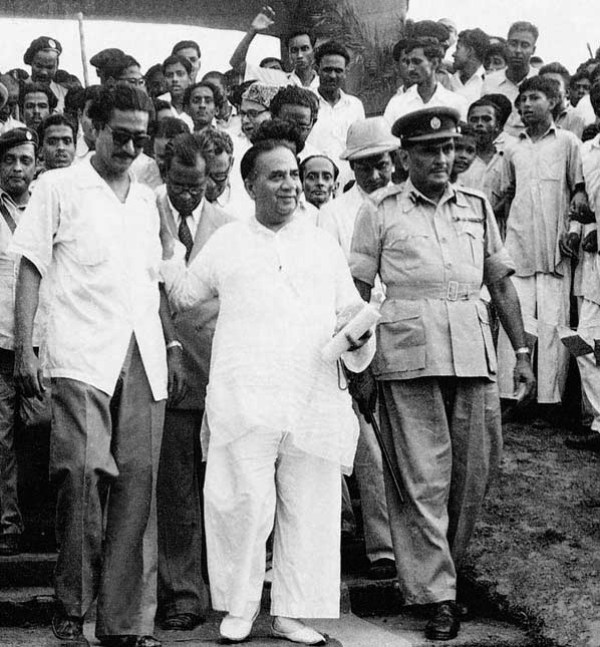
Sheikh Mujibur Rahman with his political mentor and the then Prime Minister of Pakistan Huseyn Shaheed Suhrawardy (1956)
Move to rename East Bengal as East Pakistan
In 1958, it was decided by the West Pakistani leadership that a ‘unification’ of Pakistan shall take place. Calling for the creation of West Pakistan, which would encompass Punjab, Balochistan and other provinces. Whereas East Bengal would be called East Pakistan. Mujib protested this move of the government, as it would have obliterated the identity and culture of Bengalis. Mujib was also made a part of the Second Constituent Assembly (1955-58), which was responsible for the creation of the constitution of Pakistan, making Pakistan the Islamic Republic.
A demand for equal powers
In 1958, martial law was declared in Pakistan, and the Pakistani Army led by their Commander-in-Chief General Ayub Khan launched a coup. From 1956 to 58, Pakistan saw a total of four Prime Ministers and Ayub Khan thought that it was perhaps in the best interest of Pakistan’s stability to launch a coup. Meanwhile, things began to stirrup in East Pakistan as Bengali leadership began demanding more political autonomy and powers for themselves. Sheikh Mujibur Rehman was arrested and jailed on the charges of instigating protests. He was released in 1961. Mujib, even though in jail, started an underground movement known as Swadhin Bangal Biplobi Parishad which meant Free Bangla Revolutionary Council. The protests continued and Mujib was once again arrested in 1962.
Accession to the power
After the death of Suhrawardy on 5 December 1963, Sheikh Mujibur Rahman became the head of the East Pakistan Muslim Awami League. Sheikh Mujibur Rahman was a secular leader and thought that the party belonged equally to everyone irrespective of their religion, so, as a result of this, the word Muslim was dropped from his party’s name and hence came to be known as Awami League. [13]Sheikh Mujib Triumph and Tragedy by S. A. Karim
Going toe-to-toe with President Ayub Khan
In 1958, Mujib was arrested by the police for protesting against the military coup led by Ayub Khan. This buried the seeds of conflict between Mujib and President Ayub Khan. In the early 1960s, Ayub Khan, with an intent to make Pakistan more democratic came up with the ‘Basic Democracies Plan’, which of course was not welcomed by the East Pakistani politicians as they believed that it would give more powers to the West Pakistani government, and Bengali leaders would be left high and dry once again. [14]The Awami League in the Political Development of Pakistan by M Rashiduzzaman Mujib also supported Fatima Jinnah during the 1964 Presidential Elections against President Ayub Khan, and just two weeks before the elections, Mujib was put under arrest by Ayub under charges of sedition. [15]Bangabandhu Sheikh Mujibur Rahman and Struggle for Independence: UK Foreign and Commonwealth Office, De-classified Documents, 1962–1971 by Enayetur Rahim and Joyce L Rahim There was also resentment among Bengali politicians against the atrocities committed by the Pakistani military upon the innocent Bengali speaking populace. The representation of East Pakistanis in the Pakistani military was negligible as well. [16]Pakistan: Failure in National Integration by Rounaq Jahan All of the discontents led to a vicious six-point demand of Mujib in 1966.
Mujib’s 6 point program
East Pakistan’s patience with West Pakistan was running out. In the early February of 1966, at Lahore, Sheikh Mujibur Rahman laid down the famous 6 point program in front of the ruling Pakistani government. This was widely regarded as the ‘Charter of Freedom’ calling for ‘Maximum Autonomy’. Through this, Mujib wanted to have a fair share of power for East Pakistan.
The first point of the program stated that there should be a Federally elected government, that would be elected based on a nationwide election, as earlier agreed upon in the Lahore declaration. The second point demanded freedom to decide upon the matters of East Pakistan except for the matters about defence and foreign affairs, which would remain with the federal government. The third point demanded establishing a separate form of currency, followed by the implementation of policies to stop the free flow of capital from East to West Pakistan. Mujib further demanded the implementation of different economical policies throughout East Pakistan, which is more suitable to the province’s needs. The fourth point, asked for a separate collection of taxes and revenues in East Pakistan, while only sharing some percentage of the collection with the Federal government. The fifth point of the movement asked for a separate foreign exchange reserve and the freedom for East Pakistan to establish any sort of relations with any foreign country. The final, sixth point stated that East Pakistan will have separate military and para-military forces, for adequate representation of Bengalis in the armed forces, and a naval headquarter should also be established in East Pakistan. [17]Bangladesh Awami League
Repercussions of the 6 point program
In 1968, Sheikh Mujibur Rahman, members of the Awami League and some members of the armed forces were arrested and brought into custody under the Agartala Conspiracy Case. Mujibur and his fellow conspirators were accused of plotting an armed revolution against the State of Pakistan to attain freedom from West Pakistan. They were also accused of meeting several high ranking Indian Army and Indian government officials for the purpose at, Agartala, capital of the Indian state of Tripura. Mujib and his fellow conspirators were sentenced to a court-martial at Dhaka. The case was later on withdrawn by Ayub led administration due to surmounting public pressure as violent riots erupted in East Pakistan. [18]The Daily Star
Rejecting Jinnah’s ‘Two-nation theory’
Upon being released from prison, Mujib received a hero’s welcome by his fellow Bengalis. While addressing a rally on 5 December 1969 at the racecourse, Mujib, outrightly, rejected Jinnah’s Two-nation theory, a theory based upon which Pakistan was created. Mujib stated,
There was a time when all efforts were made to erase the word “Bangla” from this land and its map. The existence of the word “Bangla” was found nowhere except in the term Bay of Bengal. I on behalf of Pakistan announce today that this land will be called “Bangladesh” instead of East Pakistan.”
Elections of 1970 and the events that lead to the creation of Bangladesh
Many West Pakistani political and military leaders began seeing Mujib as an extremist politician. Soon there were General Elections throughout East and West Pakistan. Mujib’s party managed to secure an overwhelming majority in East Pakistan, whereas, in the West, Zulfikar Ali Bhutto’s, Pakistan People’s Party secured a sweeping majority. However, Zulfikar was not in the favour of President Yahya Khan (who succeeded President Ayub Khan) calling Sheikh Mujibur Rahman to Islamabad for the formation of a joint national government. Had Yahya Khan not invited Mujib, there was an imminent threat of a civil war in East Pakistan. On one hand, Bhutto sent an offer to Mujib, asking him to become the next Prime Minister of Pakistan, while on the other hand, he was forcing President Yahya Khan to dissolve the national assembly. Till now, except for a few minor political sections of East Pakistan, no major political party, including Mujib, demanded political separation and complete autonomy from West Pakistan.
Bongobondhu’s 7 March 1971 speech
After a brief period of no solution to the political turmoil, the dream for an independent Bangladesh was finally recognized by Mujib on 7 March 1971, when he gave a speech addressing the masses and for the first time called for the independence of Bangladesh. He asked the people of East Pakistan to support his actions through the mass disobedience movement and a total boycott of West Pakistan.
In his speech he stated,
The struggle now is the struggle for our emancipation; the struggle now is the struggle for our independence. Joy Bangla!.. Since we have given blood, we will give more blood. God-willing, the people of this country will be liberated … Turn every house into a fort. Face (the enemy) with whatever you have.” [19]History of Freedom Movement in Bangladesh, 1943-1973 by Jyoti Sen Gupta
An effort to contain the freedom movement
After the announcement of the separation of East Pakistan from West Pakistan, people took to the streets and began vehemently demanding their right to freedom. President Yahya Khan declared martial law in East Pakistan and ordered the Pakistani Army to arrest all the members of the Awami League including Sheikh Mujibur Rahman. Mujib was arrested without any charges and was immediately flown to West Pakistan where he was put in solitary confinement and was presented before a military court, and was sentenced to death. His death sentence was deferred on three different occasions and for the entire course of the Bangladesh liberation war, Mujib remained in West Pakistan and was not released despite the international pressure to release the leader. [20]Dhaka Tribune
Pakistan Army and Operation Searchlight
As a last resort, President Yahya Khan gave orders for military action in East Bangladesh to curb the rioting masses and also to tackle the armed freedom fighters who were trained by India across the border. On 26 March 1971, Pakistan Army launched Operation Searchlight. The main purpose of this operation was to curb the armed Bengali militia, but it took a gruesome turn and turned out to be one of the worst military crackdowns ever. The Pakistani Army deliberately started attacking Bengalis, especially intellectuals, students and politicians. The Pakistani Army began the systematic killing of innocent civilians. Roughly around 3 million Bengalis were killed [21]The Print and between two to four lakh Bengali women were raped. [22]Rape as Genocide: Bangladesh, the Former Yugoslavia, and Rwanda by Lisa Sharlach. The tyranny of the Pakistan Army ended on 16 December 1971, when 93,000 Pakistani servicemen and civilians surrendered.
In a telegraph written by Sheikh Mujibur Rahman on the night of 26 March 1971, stated,
[The] Pakistan Army have suddenly attacked the Pilkhana EPR Headquarter and the Rajarbag Police Line as well as killed many innocents in Dhaka. The battle has started in various places of Dhaka and Chittagong. I am asking help to all the nations of this world. Our freedom fighters are valiantly fighting against the foes to save their motherland. In the name of Almighty Allah my last request and order to you all is to fight for independence till death. Ask your brothers of Police, EPR, Bengal Regiment and Ansar to fight with you. No compromise, the victory is ours. Execute the last foe from our holy motherland. Carry my message to all the leaders, activists and the other patriots from the every corner of the country. May Allah bless you all. Joy Bangla.”
Return of Mujib to Bangladesh
After international pressure mounted on Pakistan, Mujib was finally released from Mianwalla Pakistani jail on 8 January 1972. Mujib was flown directly from Pakistan to the United Kingdom, where he met Prime Minister Edward Heath and later on, addressed the media.
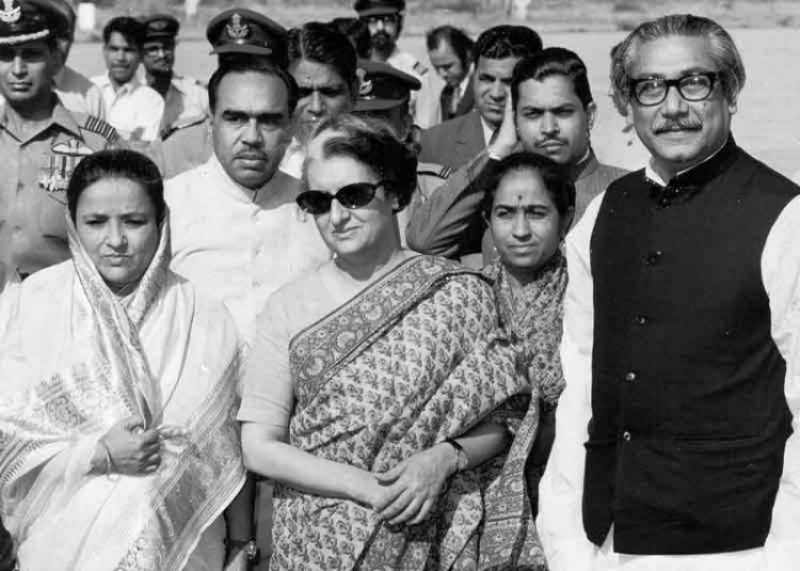
Mujib at Palam Airport being received by the then Prime Minister of India, Indira Gandhi and her cabinet after Mujib’s release from West Pakistan
While coming back he was flown to New Delhi and then he was taken to Bangladesh, where he was received and greeted by thousands of people at the airfield. [23]TIME
Bringing Bangladesh to an international stage
The impact of the liberation war on Bangladesh was too high for the country to bear on its own. Mujib went on to visit major economic powers such as the USA, the UK, USSR and several other European nations to acquire humanitarian and developmental aid. Bangladesh very quickly achieved recognition from the majority of the countries and was admitted to the United Nations and adopted a Non-Alignment Policy thereafter. Mujib maintained a close and personal relationship with India. India continued to train Bangladeshi military and government officials. [24]The Bangladesh-India Friendship Treaty: A Critical Analysis by Choudhury M Shamim Upon signing the Delhi Agreement in 1974, Bangladesh agreed to have diplomatic relations with Pakistan. Mujib also wanted Bangladesh to be a part of the Organisation of the Islamic Conference, the Commonwealth of Nations and the Islamic Development Bank to bolster the stand of Bangladesh in the world. Yugoslavia, Poland and East Germany also enjoyed good relations with the newly independent country, Bangladesh. [25]Bangladesh a legacy of blood by Anthony Mascarenhas
Efforts were undertaken to economically re-construct Bangladesh
The Bangladesh liberation war of 1971 had left the country’s economy in shambles. It had taken a lot of damage to its infrastructure and industries as well. Before the Bangladesh liberation war, a massive cyclone named Bhola had ravaged the coastal nation. The damage caused by the cyclone was extensive and it further broke Bangladesh’s economical backbone due to being neglected by West Pakistan. [26]Economic Reconstruction after Independence by US Library of Congress Mujib, to re-organize the economy of Bangladesh, came up with a 5-year plan policy. Under this policy, the government laid special emphasis upon agriculture, fishing and cottage industries as well as on the rural industries. After the liberation war was over, Bengalis began coming back from India and Pakistan, which led to the further deterioration of the economy. There was a shortage of essential commodities like food. The lack of an experienced workforce also took a toll. There were roughly around 10 million refugees that had come to Bangladesh from India. Major schemes and policies were launched by the Bangladeshi government to help them. Through the effective implementation and execution of policies, a major famine was averted. [27]Bangladesh in 1972: Nation Building in a New State by Rounaq Jahan
An article written by TIME Magazine stated,
In the aftermath of the Pakistani army’s rampage last March, a special team of inspectors from the World Bank observed that some cities looked “like the morning after a nuclear attack.” Since then, the destruction has only been magnified. An estimated 6,000,000 homes have been destroyed, and nearly 1,400,000 farm families have been left without tools or animals to work their lands. Transportation and communications systems are totally disrupted. Roads are damaged, bridges out and inland waterways blocked. The rape of the country continued right up until the Pakistani army surrendered a month ago. In the last days of the war, West Pakistani-owned businesses—which included nearly every commercial enterprise in the country—remitted virtually all their funds to the West. Pakistan International Airlines left exactly 117 rupees ($16) in its account at the port city of Chittagong. The army also destroyed banknotes and coins, so that many areas now suffer from a severe shortage of ready cash. Private cars were picked up off the streets or confiscated from auto dealers and shipped to the West before the ports were closed.” [28]TIME
A barrage of criticism for Mujib
Not everything was going up the slope. Mujib was widely criticised for neglecting problems at the local level, as he laid more emphasis upon the problems at a larger national level. [29]Decentralization and Access: Theoretical Framework and Bangladesh Experience by Mohammad Habibur Rahman Bangladesh did not only had a secular Awami League as a political party but there were communists as well as Islamic fundamental groups who were not happy with Mujib’s declaration of a secular Bangladesh. [30]Bangladesh: Era of Sheikh Mujibur Rahman by Moudud Ahmed Mujib was further accused of making policies that directly led to the 1974 famine in Bangladesh which resulted in a rapid increase in the prices of rice, acute food shortages and the death of an estimated 1.5 million Bangladeshis. The effects of the famine were further intensified by Mujib’s faulty market and price regulation policies. [31]Long-Run Impacts of Famine Exposure: A Study of the 1974 – 1975 Bangladesh Famine by Gisella Kagy Mujib was further criticised for strictly controlling political activities in the country.
In his article in the New York Times, Bernard Weinraub defined the situation of Bangladesh during the famine. He stated,
Thousands have died of starvation, largely because of floods that devastated the summer crop. The price of coarse rice has increased by 240 per cent in the last year. The jute mills, the main export earner, are producing 40 per cent less than four years ago. Thousands of farmers have sold their pots and pans, their bullocks, even their land to buy food, and are now forlorn squatters in the villages. The streets of Dacca are filled with women begging for money and children carrying naked, often frighteningly thin infants. Hungry families sit silently by. A woman carrying a dead child wails outside the building that houses the American Embassy.” [32]The New York Times
Controversies
- Mujib was accused of arresting political activists and killing 40,000 people through his militia known as Jatiyo Rakkhi Bahini and the Bangladeshi Army. [33]Extrajudicial Killing in Bangladesh: A Murder of Human Rights by A.Z.M. Habib
- Mujib was further accused of nepotism. He is said to have appointed his relatives at several high ranking official posts in the government. [34]Bangladesh: Era of Sheikh Mujibur Rahman by Moudud Ahmed
- It is said that Mujib wanted to establish a political dynasty in Bangladesh. He is said to have given waivers to his relative, Sheikh Fazlul Haque Mani for conducting private trade with India, especially at a time when the trade was banned with India due to slow inflation in Bangladesh. [35]Bangladesh: Past and Present – Salahuddin Ahmed
- Sheikh Mujibur is also said to have saved a rape accused, who also happened to be Awami League’s youth leader, from being punished and brought to justice. [36]Bangladesh: A Legacy of Blood by Anthony Mascarenhas
- Mujib preferred giving Mukti Bahinis higher posts in his newly established government as well as in the army, over the well-trained army officers of the Bangladesh Army, which led to resentment among the officers who fought the liberation war of 1971. [37]Londoni
- Sheikh Kamal, who was Mujib’s eldest son was supposedly involved in a bank robbery and was wounded in a shootout with the local police of Bangladesh. [38]Londoni [39]Asian Thought & Society: An International Review Volume XI by Ignatius J. H.
- To have better control over the Bangladesh Army, Sheikh Mujibur Rahman sent his second son Sheikh Jamal to Royal Military Academy, Sandhurst, United Kingdom. It is also believed that Jamal was to be directly appointed as a Lieutenant Colonel and would be given an important position in the army. Sheikh Mujibur is also believed to have said that after the training Jamal would someday be in command of ‘my army’. [40]Londoni
Awards
- Sheikh Mujibur Rahman was awarded the Mahatama Gandhi Peace Prize in 2020. This award was handed over to the current Prime Minister of Bangladesh, Sheikh Hasina, daughter of Sheikh Mujibur Rahman, by the Indian Prime Minister Narendra Modi. [41]Deccan Herald
Honours
- The Delhi University and the Indian Council for Cultural Relations (ICCR) have established the Bangabandhu Chair to honour Skeikh Mujibur Rahman. [42]The Times of India
- To honour Mujib, the United Nations and the government of Bangladesh has initiated the “Bangabandhu Sheikh Mujibur Rahman” International Prize in the field of Creative Economy. [43]United Nations Educational, Scientific and Cultural Organization
- Sheikh Mujibur Rahman was termed as ‘Bongobondhu’ which means ‘Friend of Bengal’ by the people of Bangladesh during the Bangladesh liberation war.
- The government of Bangladesh proclaimed 17 March 2020 till 16 December 2021 as ‘Mujib Year’. It was done to celebrate Sheikh Mujibur Rahman’s hundredth birth anniversary.
- Every year 15 August is known as ‘Mourning Day’ in Bangladesh because Sheikh Mujibur Rahman along with the majority of his family was assassinated on 15 August 1975.
- Turkey has named a residential avenue after Bangabandhu Sheikh Mujibur Rahman, to honour the leader.
- A bust of Sheikh Mujibur Rahman was revealed in London on 17 December 2016.
- India released a stamp in honour of Sheikh Mujibur Rahman celebrating ‘Mujib Year’.
- World Peace Council awarded Mujib with Julio-Curie Award for his contribution towards world peace.
Assassination
There were a lot of factors that led to the assassination of Sheikh Mujibur Rahman and his family. Mostly it was due to dissatisfaction of the military with the Prime Minister.
The bone of contention
Mujib became the first Prime Minister of Bangladesh. With this, a lot of power was transferred into his hands. Mujib started laying more emphasis on the political militia known as Jatiya Rakkhi Bahini or JRB. The JRB was tasked with political killings and tortures, especially those who were against the Awami League. The traditional military, which included the Bangladesh Army and elements of Mukti Bahini (they undertook guerilla warfare against the Pakistani military during the Bangladesh liberation war) began losing their faith in their leader as its funding was drastically reduced by the government. [44]A Political and Economic Dictionary of South Asia by Jivanta Schottli, Subrata K. Mitra, Siegried Wolf
Split in the Awami League due to differences
From 1972 to 75, the Bangladesh Chhatra League, a student wing of the Awami League, began developing cracks among its ranks. A leftist ideology began influencing the members of the student union and there were noticeable ideological clashes within the party. As a result of this, the student union split and a new political party known as Jatiya Samajtantrik Dal or JSD was formed under the leadership of Colonel Abu Taher and Hasanul Haq Inu, a seasoned politician. JSD had an armed wing known as Gonobahini, which started massacring anyone who was supporting the national government. This split of the Awami League is one of the major factors that led to the assassination of Sheikh Mujibur Rahman as it broke the entire law and order situation of the country. [45]The Daily Star
Censorship and allegations of establishing a Sheikh dynasty in Bangladesh
On 7 June 1975, Mujib and his party banned all other political parties, and not only this but the independent media and press were also banned. Mujib thought that this would bring political stability to Bangladesh and would lead to the overall development of the country. Efforts were also made by Mujib to bring the judiciary under political control. Many people saw this as an authoritarian attempt to control the masses and many people, including several party members of Mujib, protested against this undemocratic move. [46]Mint [47]Counter Currents
The famine of 1974
Poor and inept administration led to the ineffective execution of economical policies. There was a severe shortage of foodgrains, and the situation further deteriorated because of the widespread corruption, especially in the rural areas of the country. The natural resources and wealth were used extensively without any clear goal in sight. Even the progress of industrialisation was slow and ineffective, and all of this made the situation even more grave in 1974 in Bangladesh. [48]Public Policy and Governance in Bangladesh: Forty Years of Experience by Nizam Ahmed
The unfateful coup of 1975
Sheikh Mujibur Rahman was at his residence on the morning of 15 August 1975. The conspirators were from the army, Bengal Lancers and 535th Infantry Division was involved and were tasked to take over the Prime Minister’s residence. Sukharanjan Dasgupta in his article wrote,
According to foreign journalists, the operation started at 12.30 A.M. … divided into four groups. The first group rolled towards Mujib’s residence … The first group was formed with selected soldiers from the Bengal Lancers of the First Armoured Division and the 535 Infantry Regiment. It was put under Major Huda.” [49]Midnight Massacre in Dacca by S. Dasgupta
At the Prime Minister’s residence, the army shot and killed Sheikh Mujibur Rahman, his wife Sheikh Fazilatunnesa Mujib, his eldest son Sheikh Kamal, his younger brother Sheikh Nasser, his second son, and an army officer himself Sheikh Jamal and his youngest son Sheikh Russel along with his two daughters-in-law.
The event has been described by S Dasgupta in his book as,
The murderers rushed upstairs … they came across Begum Lutfunnessa Mujib … Shots rang out again. Begum Mujib lay on the floor, dead … A group searched the ground floor. In the lavatories, they found Sheikh Nasser and a couple of servants and gunned them down. The other group charged into Mujib’s bedroom. There they found the two daughters-in-law of Mujib along with Sheikh Jamal and Sheikh Russel … they, too, were not spared by these butchers.” [50]Midnight Massacre in Dacca by S. Dasgupta
Tajuddin Ahmed, Mansur Ali, Syed Nazrul Islam and A. H. M. Qamaruzzaman, the four founding fathers of the Awami League were arrested and sent to Dhaka Jail only to be murdered months later in November. In his book, Midnight Massacre in Dacca, S Dasgupta wrote,
3 November … Khondakar also knew that the situation was bound to be grave once Nazrul Islam, Tajuddin Ahmed, Kamaruzzaman and Mansur Ali were released … Khondakar had had them arrested under various pretexts shortly after Mujib’s assassination, and they were still rotting in Dacca Jail. So, Khondakar … managed to allow the associates of the “killers” [the seven Majors who assassinated Sheikh Mujibur Rahman] inside the jail to brutally kill these four leaders.” [51]Midnight Massacre in Dacca by S. Dasgupta
Sheikh Mujibur Rahman’s daughters, Sheikh Hasina and Sheikh Rehana were both in West Germany on 15 August 1975 and later on returned to India and stayed there in exile till 17 May 1981. [52]Business Standard
Facts/Trivia
- The 7 March 1971 speech of Sheikh Mujibur Rahman is considered to be one of the best speeches ever given by any orator.
- Fidel Castro, the dictator of Cuba, compared Mujib to the Himalayas. He stated in an interview,
I have not seen the Himalayas. But I have seen Sheikh Mujib. In personality and in courage, this man is the Himalayas. I have thus had the experience of witnessing the Himalayas.”
- Mujib was an avid lover of sports. He used to play and follow everything, especially football.
- Despite Mujib’s father’s disapproval, Mujib, as a young child, once distributed rice to the famine-stricken people of his village.
- When the Prime Minister of Bengal came to visit their school at Gopalganj, Mujib led a protest in front of the Prime Minister to have the roof of their school repaired, hence, showcasing the early qualities of a leader. [53]Dhaka Tribune
- Sheikh Mujibur Rahman’s ancestry can be traced back to Iraq when one of his ancestors came to the Indian sub-continent to preach Islam 400 years ago. [54]Bangladesh Awami League
- Mujib was a very generous person. As a child, he gave away his clothes to a homeless, poor boy and came back home in a shawl.
- As a child, Sheikh Mujib had a keen interest in learning the Persian language. [55]Bangladesh Awami League
- On 15 August 1975, Sheikh Mujibur Rahman was not executed on the spot, rather he was asked to resign from his post, to which he refused. S Dasgupta wrote in his book,
Reports reveal that they did not kill Sheikh Mujib at once. Mujib was asked to step down from power and he was given some time to decide. Mujib summoned Colonel Jamil, the new chief of the Military Intelligence over the phone. Colonel Jamil arrived fast and ordered the army to return to the barracks … Then a rapid burst from machine guns mowed down Jamil right in front of the gate.” [56]Midnight Massacre in Dacca by S. Dasgupta
- Out of 23 years of Pakistan’s rule on Bangladesh, Sheikh Mujibur Rahman spent 12 years in prison for leading the Bangladeshi freedom movement. [57]Embassy of Bangladesh – Washington DC
- Mujib’s parents used to lovingly call him “Khoka”, meaning a little boy. [58]The Korea Post
- Colonel Muammar Gaddafi, who was once a dictator of Libya, is believed to have funded for the assassination plot of Bangladesh’s Prime Minister Sheikh Mujibur Rahman. [59]Eurasia Review
References

